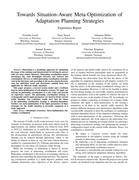New accepted paper at the IEEE International Conference on Autonomic Computing and Self-Organizing Systems (ACSOS) [05.07.21]
Tanja Noack and Christian Krupitzer from the Department of Food Informatics are co-authors of the peer-reviewed confercence paper "Towards Situation-Aware Meta-Optimization of Adaptation Planning Strategies" at the IEEE International Conference on Autonomic Computing and Self-Organizing Systems (ACSOS).The experience report "Towards Situation-Aware Meta-Optimization of Adaptation Planning Strategies" by Veronika Lesch (University of Würzburg) with co-authors Tanja Noack (Department of Food Informatics, University of Hohenheim), Johannes Hefter (University of Würzburg), Samuel Kounev (University of Würzburg) and Christian Krupitzer (Department of Food Informatics, University of Hohenheim) was accepted at the IEEE International Conference on Autonomic Computing and Self-Organizing Systems (peer-reviewed). The International Conference on Autonomic Computing and Self-Organizing Systems, sponsored by IEEE and founded as a merger of the IEEE International Conference on Autonomic Computing (ICAC, Core-Rating: B) and the IEEE International Conference on Self-Adaptive and Self-Organizing Systems (SASO), provides a forum for sharing the latest research results, ideas and experiences in autonomic computing, self-adaptation, and self-organization.
Platooning is a promising approach for optimizing the usage of the existing road infrastructure by driving in convoys with low inter-vehicle distances. Platooning coordination fosters advantages like road throughput increases and reduced fuel consumption. Diverse so-called platooning coordination strategies exist in the literature and according to the no-free-lunch theorem, each has individual assets and drawbacks, making them best applicable for different traffic situations. This paper proposes a layered system model and a feedback loop for meta-optimization of self-adaptive systems. We apply our concept on platooning coordination as a case study and provide an experience report. The platooning coordination strategy is exchangeable and its input parameters are tuned to fit the current traffic situation. Our evaluation results show that the choice of the platooning coordination strategy is situation-dependent. Further, our meta-optimization of the input parameters of these strategies for the traffic situation is favorable compared to a static approach.
The publication is available in IEEE Xplore digital library.


